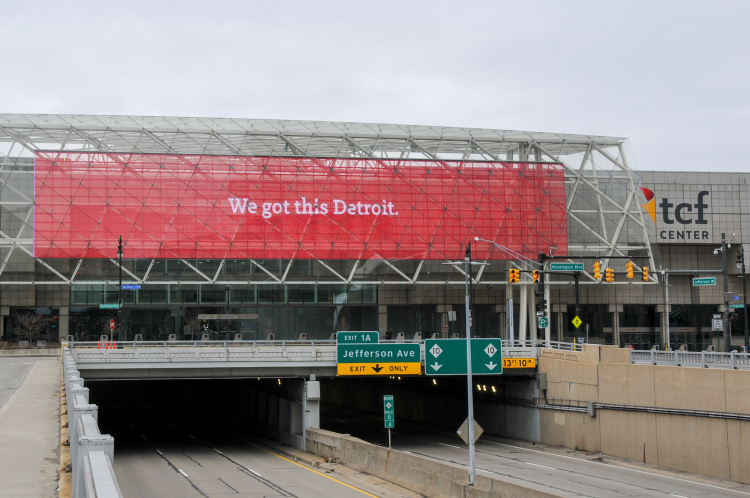Detroit: What the Motor City is Teaching Us about Covid-19

Detroit, Michigan has emerged as the second largest metropolitan area for Covid-19 infections and deaths in the United States, behind New York City. With Michigan still under a Stay at Home order, unlike other states, it seems unlikely for this to be the case. So why is Coronavirus running rampant in the Motor City?
See you soon. Image credit: ShutterstockOne reason is related to the city's high poverty rate. In 2018 the US Census Bureau found that 11.8% of Americans overall were below the poverty line. In Detroit, the number is almost triple, with three in every ten people living below the poverty line. For that three in ten, the question of whether to social distance or put food on the table is no question at all.
Working at the minimum wage or slightly higher also has its health risks. According to a recent New York Times article, Detroit has high rates of asthma and other chronic diseases, often linked to poor working conditions. Pre-existing conditions that affect the respiratory system are the ones that exacerbate the effects of the Coronavirus. While it's technically true that the virus infects anyone and everyone, to say that it is blind to economic class would be to ignore the impossibility of social distancing and the effect of respiratory chronic illness in the city of Detroit.
A street in Detroit. Image credit: ShutterstockAnother contributing factor that may surprise some is race. According to the US Census Bureau, Black or African American residents make up only 14.1% of Michigan's population but 78.6% of the population in the city of Detroit. Native Detroiter and community leader Yusef "Bunchy" Shakur says of Black residents' particular situation, "social connection for Black Detroiters has for years been a matter of survival."
In an American city described as one of the most segregated in the 21st century, in a country where a black man has a one in one thousand chance of being killed by a police officer, social connections quite literally help to protect lives. It is understandable then, that when asked to social distance, the Black majority in Detroit comes up against another barrier.
Shakur further reflects "Hanging on corners, barbershops, malls and salons high-fiving, laughing, sharing hugs and sharing a good ol’ time is part of how we interact, because these gatherings were outlawed once in this country." You can read more of Shakur's writing on the subject on Deadline Detroit.
Downtown Detroit. Image credit: ShutterstockThe Covid-19 situation in Detroit is being further exacerbated by the water crisis that is ongoing. According to the American Civil Liberties Union, in 2014, the City of Detroit shut off the water for 20,000 delinquent accounts, many of which were the same people living in poverty. In 2018, the city had announced plans to shut off 17,000 more accounts.
According to The Guardian, the most recent number without water is 141,000. Local organizers have long protested that these water shutoffs are a breach of the human rights guaranteed to American citizens. In the Covid-19 pandemic, this is more true than ever. Without running water, it becomes difficult, if not impossible for many Detroit residents to practice effective hand washing. In response to the pandemic, the State of Michigan has made an attempt to reinstate running water to residents for $25 per month during the pandemic.
Another street in Detroit. Image credit: ShutterstockThe state has also said, however, that post-coronavirus, past-due bills will still be expected and water shutoffs will resume accordingly. The question remains, when will the pandemic be considered over enough to return to water shutoffs? Could water shutoffs in the case of a low viral count be enough to spur a second wave?
The particular set of pre-existing circumstances in Detroit has proven the perfect storm to help Covid-19 wreak havoc on the city and its residents. What is demonstrated by current events is that while a virus can technically infect anybody, a global pandemic does not affect all people equally. Social factors such as race, economic class, and the institutional policies that act on these social factors are capable of impacting spread and severity, and are hence far from blameless.











